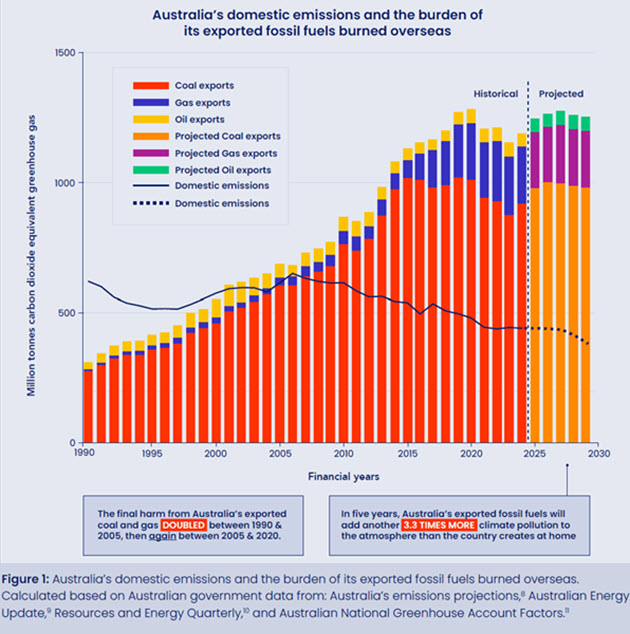RenewEconomy - Royce Kurmelovs
 |
| AAP Image/Supplied by Queensland Fire and Emergency Services |
Exporting Harm Climate Toll Australia’s Fossil Fuel Expansion Key Findings
|
The report, Exporting Harm: The Climate Toll of Australia’s Fossil fuel Expansion, by the Fossil Fuel Non-Proliferation Treaty Initiative, a diplomatic and civil society campaign to create a treaty to stop fossil fuel exploration, expansion and set up a managed phase-out of oil, gas and coal use, to examine Australia’s track record on climate change.
It found that despite its rhetoric, Australia has worked to establish itself as “a fossil fuel behemoth” over the past three decades since the International Panel on Climate Change released its First Assessment report in 1990, with the country exporting increasing amounts of fossil fuels even as its domestic emissions have fallen.
In the fifteen years after the release of the First Assessment Report, the burden of Australia’s fossil fuel exports doubled. It doubled again between 2005 and 2020, driven by a massive increase in coal and gas exports.
During this time the Australian government was variously led by both Labor and the Coalition, in what Michael Poland, campaign manager for the Fossil Fuel Treaty Initiative in Northern New South Wales said was “a bipartisan consensus on expanding coal and gas.”
“At least Russia is somewhat honest about being a major fossil fuel producer,” Poland said. “I think for me that fossil fuel exports have doubled twice in the past three decades really just shows how deeply ingrained bipartisan support for the fossil fuel industry is.
“Both major parties have had a bipartisan position on expanding oil and gas. In the wake of years of cyclones and floods and heatwaves, it’s really time to break that repetitive cycle.”
With the focus of international agreements like the Paris Climate Agreement focussed on the domestic use of oil, gas and coal, Poland said the US, Canada and Australia have been able to rely on the “drug dealers defence” – idea that exporters are just filling a demand and that if they don’t sell a particular fossil fuel, someone else will – to justify continuing fossil fuel expansion.
Poland, whose family live in northern New South Wales and who have been without power since Thursday just before Tropical Cyclone Alfred made landfall, said the findings were particularly “surreal given the circumstances.”
“The thing I’ve been thinking about at night while I’ve had no power is that the Albanese government has approved 19 fossil fuel projects since the 2022 Lismore floods and that the PM this week could come back to Lismore and not take responsibility for the impact those decisions are having on events like this and communities like ours,” he said.
 The report found 48% of the world’s
internationally-traded metallurgical coal and 19% of thermal coal
originated in Australia, making the country the second-largest exporter
of each, respectively.
The report found 48% of the world’s
internationally-traded metallurgical coal and 19% of thermal coal
originated in Australia, making the country the second-largest exporter
of each, respectively.
Australia’s LNG exports have increased seven-fold since 2005, with the country now producing 20% of all internationally-traded LNG.
Meanwhile the country currently has 30 new coal and gas projects at various levels of development, with a conservative estimate suggesting this could add 18.6bn tonnes of greenhouse gases to the atmosphere.
The possibility that a cyclone such as Tropical Cyclone Alfred might make landfall in South East Queensland was previously described in 2021 as a “nightmare scenario” by the Australian insurance industry owing to high population density in the region.
Australia has been increasingly rocked by large natural disasters likely to have been made worse by climate change in recent months and years, including bushfires outside Perth and in regional Victoria, a developing drought in South Australia, widespread flooding across New South Wales in 2022 and the Black Summer Bushfires.
 As of 2021, climate change was costing the country $39bn a year, with this figure expected to rise to $73bn by 2060.
As of 2021, climate change was costing the country $39bn a year, with this figure expected to rise to $73bn by 2060.
Currently 16 governments have endorsed a Fossil Fuel Non-Proliferation Treaty including the governments of Colombia and Pakistan, and Pacific countries such as Fiji, Nauru, Samoa, the Solomon Islands, Timor-Leste, Tuvalu, Vanuatu and Tonga.
Links
- REPORT Exporting Harm: The Climate Toll of Australia’s Fossil Fuel Expansion
- A fossil fuel behemoth: Report exposes Australia’s hypocrisy in wake of Cyclone Alfred
- Fortescue supports global call for a Fossil Fuel Treaty to deliver Real Zero emissions target
- Report finds G20 reserves could blow 2ºC carbon budget despite wealthiest nations being ready to transition
- Open letter from over 100 artists, scientists and climate champions calls for global plan to phase out fossil fuels amid bumpy COP29 talks on finance goal
- Albanese pledges another $750 in funds for green industry and metals
- Coalition refuses to back Australia and Pacific Island nations hosting 2026 UN climate summit
- Energy Insiders Podcast: Donald Trump’s war on climate, energy and science

No comments :
Post a Comment